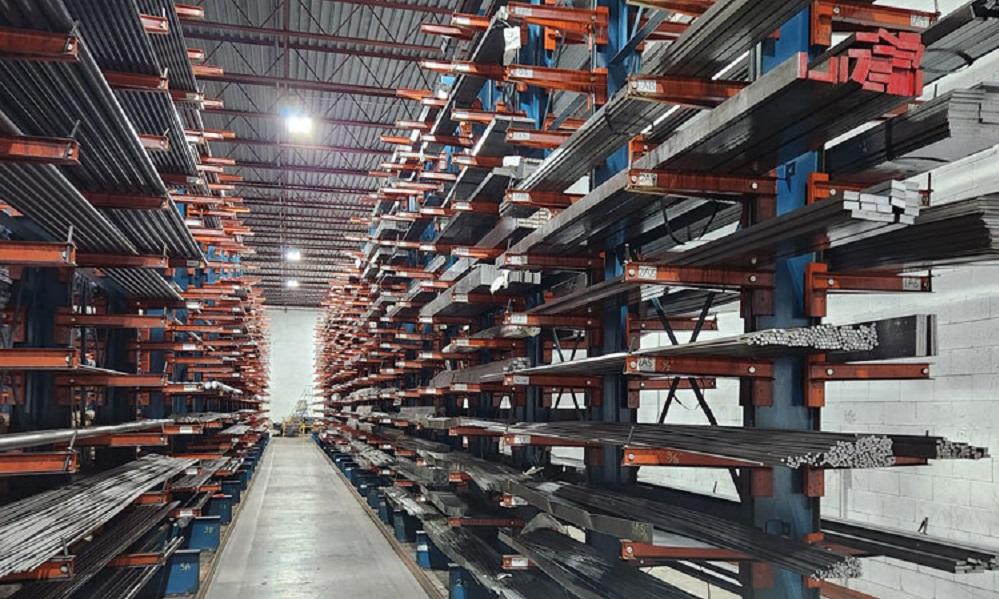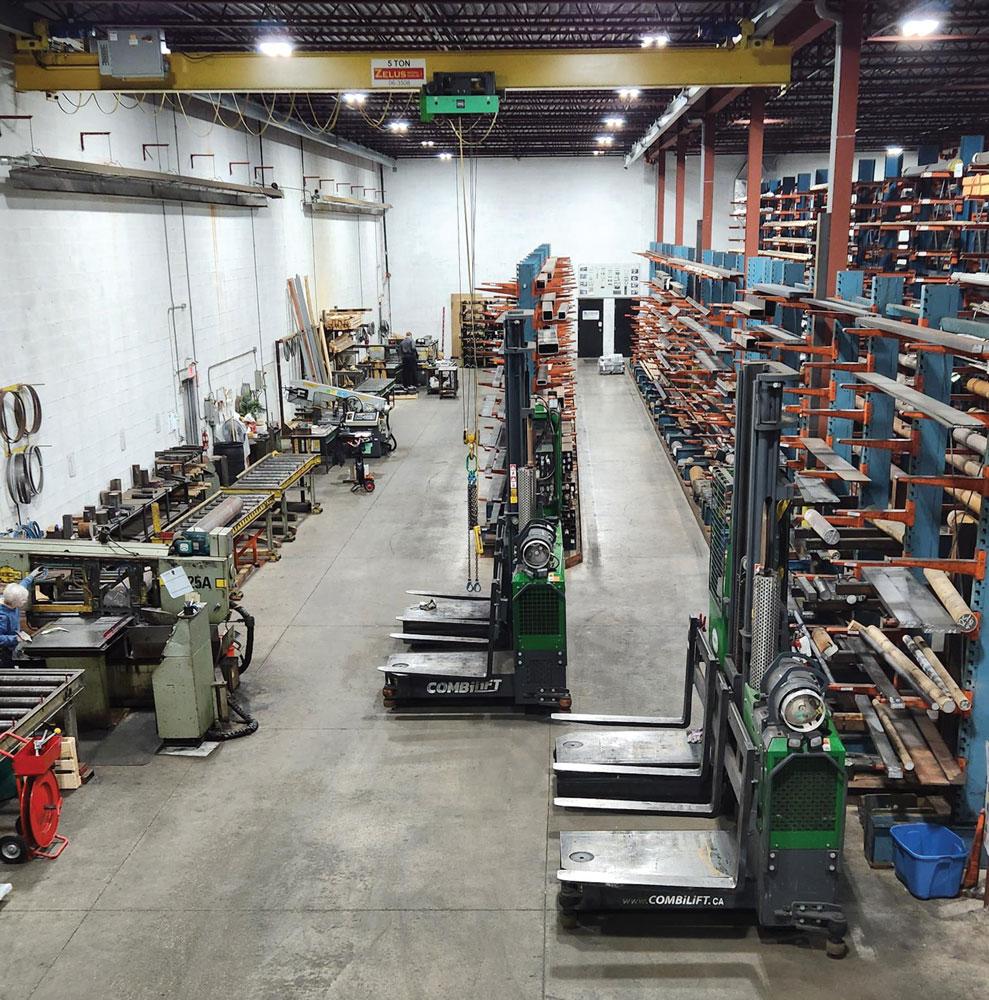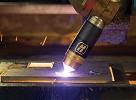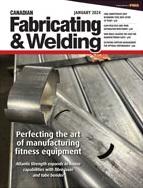Editor
- FMA
- The Fabricator
- FABTECH
- Canadian Metalworking
Core competencies keep Richmond Steel busy after 30 years
Product mix, service, team help Hamilton, Ont.-based steel supplier thrive
- By Rob Colman
- February 13, 2024
- Article
- Fabricating

Richmond Steel has made its name in focusing on a few key products: 4140-grade cold-drawn product; 4140 cold-drawn annealed; 1045 turned, ground, and polished; and 4140 turned, ground, and polished product. Images: Richmond Steel
Although all company success stories are a little different, most include a few fundamental core competencies. Richmond Steel, which celebrates its 30th year in business in 2024, is a stellar example of a company that exemplifies these three core competencies: understanding your core product, attending to customer service, and maintaining a core team who communicates effectively.
There are no guarantees in business, but on such an important anniversary, it’s worth reflecting on how this company has managed to thrive.
History
Founder Bruce Richmond started the business with two colleagues when he decided he wanted to work closer to Hamilton, Ont., which he has always called home.
“I was working in sales for a company that decided to move its business to Concord, Ont., north of Toronto,” said Richmond. “I had no interest in moving there or doing that commute, so instead I took a job with what was called The Metal Store at the time in Mississauga. The owner was someone very similar to me in outlook and education, which made me think, ‘I should be able to start a business like this myself.’”
Initially Richmond started a franchise of The Metal Store. After five years, he found that he and the owner were interested in taking different approaches to the market, so they parted ways amicably.
“It was then I launched Richmond Steel and started buying directly from the mills,” said Richmond.
Richmond’s family was involved in the steel industry for generations. His father worked at Dofasco all his life, his grandfather worked at Stelco, and his great-grandfather for Wallace Barnes, so in some ways it was natural that he would gravitate to the industry.
“My father encouraged me to go to university for business because he wanted something better for me,” Richmond said. “Schooling was important in helping me grow the business, but you better have a strong back working in this industry as well.”
People and Processes
A key part of keeping a business going is finding the right people to support its operations, and the founders were very effective right from day 1 in finding Mike Book to join their team. Book had actually been coached in hockey by the founders, and they obviously saw a work ethic and determination in him that made sense for their business plans. He has been president for 15 years now.
Book believes that it’s the people at Richmond that make the biggest difference in maintaining the business.

"Staying lean, we've achieved efficiencies by communicating well and putting our heads together to sort through inefficiencies as we see them," said Book.
“There are 10 of us in the company,” said Book. “You hear reports that say that Canada’s productivity is low, but I think we’ve been able to achieve more with fewer people over the years. You have to because it is hard to find new employees. But for us, it’s also the fact that almost everyone in the company has been here for at least five years. Staying lean, we’ve achieved efficiencies by communicating well and putting our heads together to sort through inefficiencies as we see them.
“We do enjoy ourselves here, and there’s a conscious understanding of the need for that,” Book continued. “We work 40 hours a week, which means sometimes we’re with each other more than our families. That determination to have fun helps keep turnover low and our team engaged.”
Service
Customer service is the other side of that engagement coin.
“Anyone can match on price,” said Book. “I think good customer service carries us a long way. We focus on trying to help the customer, especially if they are in a jam and need product for same-day delivery. Because we’re small, we’re also flexible. We can move in the direction we need to move to prioritize what the customer needs.”
A lot of that service gets back to the basics of courtesy and kindness—being friendly on the phone, having conversations with the customer to get to know them better.
“You can’t build the relationships you used to be able to when everything was done over the phone, so when you do get a chance to talk to someone, we want to make sure they have a pleasant experience,” said Book. “And it should be the same with a long-standing customer and someone new, because you never know how that relationship might develop.”
Focused Market
It’s also important to understand how to make your business stand out in such a competitive sector, and a big part of that is understanding the key products that will make you stand out.
“We started supplying customers with cold-drawn bar because that’s what we knew, along with precision-ground shafting, then branched out into all the hot-rolled products,” said Book. “We then noticed that the market was underserved in the 4140-grade cold-drawn product. Now, 4140 cold-drawn annealed; 1045 turned, ground, and polished; and 4140 turned, ground, and polished are our key products. We carry them in metric and imperial sizes.
“Those are our core focus,” he continued. “We do have other product, but it’s for our core customers who might need small cut pieces in other materials. We’re glad to help them. We have a $15 minimum order, which tells you how small an order could get. If someone walks in, we can take care of them, but most of our orders are managed through our two websites. We serve customers across the country, so that web presence is key.”
Book sees Richmond Steel’s specialty as serving a highly technical market.
“The average Canadian worker is a highly educated, highly paid technical person,” he said. “These days, most of the work in Canada is highly engineered one-off products, so I looked at what went into the machinery of such products—the robotics, the automation, the conveyors, that kind of thing. Canada is really good at supplying those types of products. These products use a lot of cold-finished bar, a lot of 4140, and a lot of shafting. We wanted to be part of that market.”
One of the big trends that Book has seen grow in importance over the past 30 years is material traceability.
“All of our steel has a pedigree, which is critical for our customers,” he said. “Go to any piece of steel in our facility and we can give you a mill test report on it. We bring in predominantly North American and European product.”
Before the pandemic and the stress on supply chains, Richmond Steel was starting to branch out into other materials, but those events were a reminder of what a smaller shop can do if it focuses its energies.
“That was an interesting experience for us,” said Book. “Over the years, it’s easy to get complacent about where you are getting your materials from. We had a lot of new customers calling us that we had never heard from before. We were able to show them the same level of service that they’d received from other suppliers, which was important for us. And we did a good job of managing our supply challenges. We found new suppliers and built new relationships with some that have lasted, sourcing steel from new parts of the U.S. we hadn’t dealt with before. We have learned to adapt
.“We gained new customers as well, people who were sourcing steel directly from the U.S., and saw that maybe that wasn’t ideal for freight logistics,” he continued. “Building their strength, we’ve built up our own strength.”
Book can look back on that experience and see how they were able to navigate change by focusing on core competencies. But ultimately, that’s nothing without the right team.
“It’s all about our people,” he said. “We’re lucky to have a skilled and dedicated team here. That’s the key to productivity, which is the key to success.”
Editor Robert Colman can be reached at rcolman@fmamfg.org.
Richmond Steel Canada, richmondsteelcanada.ca
About the Author

Rob Colman
1154 Warden Avenue
Toronto, M1R 0A1 Canada
905-235-0471
Robert Colman has worked as a writer and editor for more than 25 years, covering the needs of a variety of trades. He has been dedicated to the metalworking industry for the past 13 years, serving as editor for Metalworking Production & Purchasing (MP&P) and, since January 2016, the editor of Canadian Fabricating & Welding. He graduated with a B.A. degree from McGill University and a Master’s degree from UBC.
subscribe now


Keep up to date with the latest news, events, and technology for all things metal from our pair of monthly magazines written specifically for Canadian manufacturers!
Start Your Free Subscription- Trending Articles
Aluminum MIG welding wire upgraded with a proprietary and patented surface treatment technology

Achieving success with mechanized plasma cutting

Hypertherm Associates partners with Rapyuta Robotics

Gema welcomes controller

Brushless copper tubing cutter adjusts to ODs up to 2-1/8 in.

- Industry Events
MME Winnipeg
- April 30, 2024
- Winnipeg, ON Canada
CTMA Economic Uncertainty: Helping You Navigate Windsor Seminar
- April 30, 2024
- Windsor, ON Canada
CTMA Economic Uncertainty: Helping You Navigate Kitchener Seminar
- May 2, 2024
- Kitchener, ON Canada
Automate 2024
- May 6 - 9, 2024
- Chicago, IL
ANCA Open House
- May 7 - 8, 2024
- Wixom, MI















